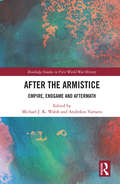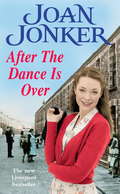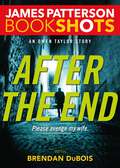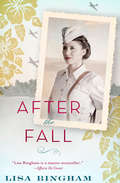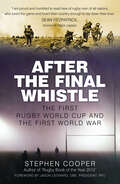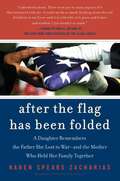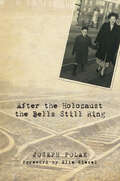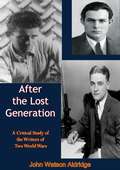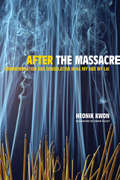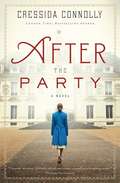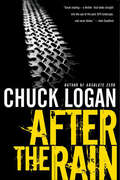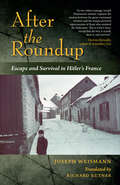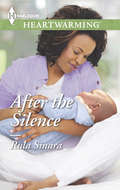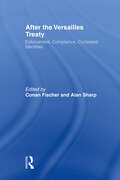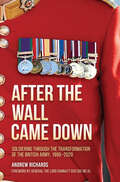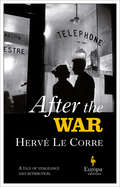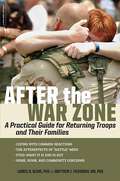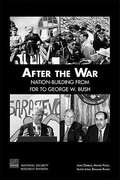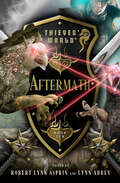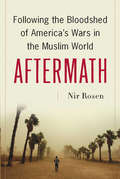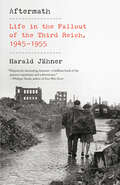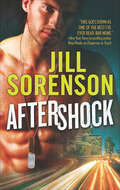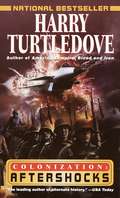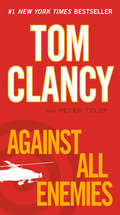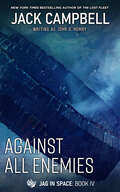- Table View
- List View
After the Armistice: Empire, Endgame and Aftermath (Routledge Studies in First World War History)
by Michael J. K. Walsh; Andrekos VarnavaA century after the Armistice and the associated peace agreements that formally ended the Great War, many issues pertaining to the UK and its empire are yet to be satisfactorily resolved. Accordingly, this volume presents a multi-disciplinary approach to better understanding the post-Armistice Empire across a broad spectrum of disciplines, geographies and chronologies. Through the lens of diplomatic, social, cultural, historical and economic analysis, the chapters engage with the histories of Lagos and Tonga, Cyprus and China, as well as more obvious geographies of empire such as Ireland, India and Australia. Though globally diverse, and encompassing much of the post-Armistice century, the studies are nevertheless united by three common themes: the interrogation of that transitionary ‘moment’ after the Armistice that lingered well beyond the final Treaty of Lausanne in 1924; the utilisation of new research methods and avenues of enquiry to compliment extant debates concerning the legacies of colonialism and nationalism; and the common leitmotif of the British Empire in all its political and cultural complexity. The centenary of the Armistice offers a timely occasion on which to present these studies.
After the Dance is Over: A heart-warming saga of friendship and family (Molly and Nellie series, Book 5)
by Joan JonkerWith love on the horizon for their children, but sabotage just around the corner, two friends fight for those they love... while having a blast, of course. In After the Dance is Over, Joan Jonker brings us another instalment of her hugely popular Molly and Nellie series, as the two friends get up to more mischief in their beloved Liverpool. Perfect for fans of Dilly Court and Katie Flynn. 'There's something for everyone and all delivered up in that inimitable Jonker style which is guaranteed to delight her large number of fans' - Middlesborough Evening GazetteThere's never a dull moment when Nellie McDonough and Molly Bennett get together, and there's always something to keep them busy in their Liverpool street. First, Molly's son Tommy sets the date for his wedding to Rosie O'Grady, and everyone's saving hard to ensure their day is perfect. Then a new family arrive in the area and their daughter is determined to put a stop to the budding romance between Nellie's son Paul and Phoebe Corkhill. Meanwhile, Molly's daughter Doreen and her husband Phil make an announcement, and Nellie and Molly are determined to track down Phil's long lost family, so that they can share in the joyful news... What readers are saying about After the Dance is Over: 'Being an enthralled fan of Joan's books, I couldn't wait to read this book... this book is definitely the funniest yet! Molly and Nellie are hilarious, warm, honest and very touching''Enjoy a stroll down a Liverpool street in the early 40s, feel the warmth of the residents, laugh at the antics of two very humorous ladies, but also have a hanky ready to collect your tears of laughter'
After the End: An Owen Taylor Story (BookShots)
by James PattersonA devastated soldier's wife wants Special Ops veteran Owen Taylor to avenge her broken husband. And she won't have to ask twice.It's payback time.BookShotsLightning-fast stories by James PattersonNovels you can devour in a few hoursImpossible to stop readingAll original content from James Patterson
After the Fall
by Lisa BinghamThe author of Into the Storm presents an epic tale of courage, danger, and love, set in the Pacific at the dawn of World War II. In late 1941, the Philippines is a haven for those intent on shedding their pasts and reinventing themselves. Lt. Riley Gilhouley—the Great Gilhouley—keeps the troops well stocked in contraband as he seeks the attention of Maj. Rosemary Dodd, a by-the-book officer who leads her nurses with expert care. Ex-priest John Macklin searches for absolution, but finds himself tangling with Glory Bee O&’Halloran, a stripper hired to take off just enough clothing to throw the troops into a frenzy. But when, mere hours after the bombing of Pearl Harbor, the Japanese attack the Philippines, the island haven explodes into the chaos of battle—and amid stolen moments and secret missions, all their lives will be forever changed. . . . Set in a besieged country waiting in vain for help to arrive, this stunning novel from a &“master storyteller&” offers a blend of riveting history and heartfelt emotion (Affaire de Coeur).
After the Final Whistle: The First Rugby World Cup and the First World War
by Jason Leonard Stephen CooperAs Britain’s Empire went to war in August 1914, rugby players were the first to volunteer. They led from the front and paid a disproportionate price. In 1919, a grateful Mother Country hosted a rugby tournament: sevens teams at eight venues, playing 17 matches to declare a first ‘world champion’. There had never been an international team tournament like it. For the first time teams from Australia, Canada, New Zealand, South Africa, Britain and France were assembled in one place. Rugby held the first ever ‘World Cup’. It was a moment of triumph, a celebration of military victory, of Commonwealth and Allied unity, and of rugby values, moral and physical. In 2019 the modern Rugby World Cup moves to Japan in the Centenary of the King’s Cup. With a foreword by Jason Leonard, this is the story of rugby’s journey through the First World War to its first World Cup, and how those values endure today. 'After The Final Whistle' was shortlisted for the 2016 Cross Sports Book of the Year award.
After the Flag Has Been Folded: A Daughter Remembers the Father She Lost to War--and the Mother Who Held Her Family Together
by Karen Spears ZachariasKaren Spears was nine years old, living with her family in a trailer in rural Tennessee, when her father, David Spears, was killed in the Ia Drang Valley in Vietnam. It was 1966 -- in a nation being torn apart by a war nobody wanted, in an emotionally charged Southern landscape stained with racism and bigotry -- and suddenly the care and well-being of three small children were solely in the hands of a frightened young widow with no skills and a ninth-grade education. But thanks to a mother's remarkable courage, strength, and stubborn tenacity, a family in the midst of chaos and in severe crisis miraculously pulled together to achieve its own version of the American Dream.Beginning on the day Karen learns of her father's death and ending thirty years later with her pilgrimage to the battlefield where he died, half a world away from the family's hometown, After the Flag Has Been Folded is a triumphant tale of reconciliation between a daughter and her father, a daughter and her nation -- and a poignant remembrance of a mother's love and heroism.
After the Holocaust the Bells Still Ring
by Joseph PolakWinner of:2015 National Jewish Book Award; Biography, Autobiography, and MemoirThis memoir is a fascinating portrait of mother and child who miraculously survive two concentration camps, then, after the war, battle demons of the past, societal rejection, disbelief, and invalidation as they struggle to reenter the world of the living. It is the tale of how one newly takes on the world, having lived in the midst of corpses strewn about in the scores of thousands, and how one can possibly resume life in the aftermath of such experiences. It is the story of the child who decides, upon growing up, that the only career that makes sense for him in light of these years of horror is to become someone sensitive to the deepest flaws of humanity, a teacher of God's role in history amidst the traditions that attempt to understand it—and to become a rabbi. Readers will not emerge unscathed from this searing work, written by a distinguished, Boston-based rabbi and academic.
After the Lost Generation: A Critical Study of the Writers of Two World Wars
by John Watson AldridgeJohn W. Aldridge is one of the few young critics of importance to appear on the literary scene since World War II. In AFTER THE LOST GENERATION he discusses with acumen and discernment the most important works of the young post-war writers of the Forties—Norman Mailer, Irwin Shaw, John Horne Burns, Truman Capote, Gore Vidal, Paul Bowles, Alfred Hayes and others.Aldridge discusses three writers of the 1920’s—Ernest Hemingway, John Dos Passos, and F. Scott Fitzgerald—to introduce the writers of World War II. He draws significant parallels between the work of the two generations—between Hemingway and Hayes, between Fitzgerald and Burns, between Bowles and Hemingway, and between the “lost generation” of the Twenties and the “illusionless lads of the Forties.” More important than the likenesses between the two generations are the new developments. Norman Mailer and Irwin Shaw wrote enormous “encyclopedic” war novels which covered whole armies and had settings in a dozen different lands. John Horne Burns sought relief from the chaos of modernity in Italian culture and Old World tradition. Truman Capote dealt essentially with abnormalities and peculiarities in human nature. Anti-Semitism, the Negro problem, and homosexuality appear time and again in the new writing. The old themes with which Hemingway and Fitzgerald shattered Victorian patterns—sex, drinking, the brutalities of war—are no longer shocking.AFTER THE LOST GENERATION is a penetrating analysis of post-war fiction that already has provoked wide controversy and discussion.“A pioneer study…The first serious and challenging book about the new novelists.”—Malcolm Cowley, New York Herald Tribune
After the Massacre: Commemoration and Consolation in Ha My and My Lai
by Heonik Kwon Drew FaustThough a generation has passed since the massacre of civilians at My Lai, the legacy of this tragedy continues to reverberate throughout Vietnam and the rest of the world. This engrossing study considers how Vietnamese villagers in My Lai and Ha My--a village where South Korean troops committed an equally appalling, though less well-known, massacre of unarmed civilians--assimilate the catastrophe of these mass deaths into their everyday ritual life. Based on a detailed study of local history and moral practices, After the Massacre focuses on the particular context of domestic life in which the Vietnamese villagers interact with their ancestors on one hand and the ghosts of tragic death on the other. Heonik Kwon explains what intimate ritual actions can tell us about the history of mass violence and the global bipolar politics that caused it. He highlights the aesthetics of Vietnamese commemorative rituals and the morality of their practical actions to liberate the spirits from their grievous history of death. The author brings these important practices into a critical dialogue with dominant sociological theories of death and symbolic transformation.
After the Party
by Cressida ConnollyA captivating novel of manners that tells the story of a dark and disturbing period of British history, by a master storyteller.It is the summer of 1938 and Phyllis Forrester has returned to England after years abroad. Moving into her sister&’s grand country house, she soon finds herself entangled in a new world of idealistic beliefs and seemingly innocent friendships. Fevered talk of another war infiltrates their small, privileged circle, giving way to a thrilling solution: the appointment of a great and charismatic new leader who will restore England to its former glory. At a party hosted by her new friends, Phyllis lets down her guard for a single moment, with devastating consequences. Years later, Phyllis, alone and embittered, recounts the dramatic events which led to her imprisonment and changed the course of her life forever. Powerful, poignant, and exquisitely observed, After the Party is an illuminating portrait of a dark period of British history which has yet to be fully acknowledged.
After the Rain
by Chuck LoganAn ex-cop races to save his wife, their daughter, and the Minneapolis-St. Paul area from nuclear disaster in this thriller by the author of Absolute Zero.Nina Pryce and her husband, Phil Broker, couldn’t have more opposite views of the military. Broker’s loyalty to the men he served with in Vietnam is matched only by his certainty that they shouldn’t have been there in the first place. Nina, though, is a new breed, a decorated and ambitious vet of the first Gulf War. As Nina proceeds along her chosen career path, Broker—until his recent “retirement,” Minnesota’s most effective, unorthodox, and controversial undercover cop—finds himself struggling in the role of patient military spouse . . . Incommunicado for months as part of a top-secret Delta antiterrorist operation, Nina, with daughter Kit in tow, suddenly emerges in Langdon, North Dakota, a town in the heart of the Cold War Minuteman II missile belt. When Broker arrives to take Kit back home, he realizes that the legacy of those warheads still casts a sinister shadow across the desolate north border country, in the person of a damaged psychopath.Broker discovers he’s been drawn into an elaborate con within a con, made an unwitting participant in a black-bag anti-terrorist detail. But his anger toward Nina for involving him and putting their daughter at risk quickly fades as a larger, more deadly reality becomes evident. With time running out, husband and wife unite with local North Dakota law enforcement to form a last line of defense against a brilliantly simple act of espionage with potentially catastrophic consequences.Praise for After the Rain“It’s an unbeatable combination: a smart, well-honed plot, fascinating characters (including a Lebanese sleeper spy, various local smugglers and a sexually deviant psycho-killer) and a writer with an original voice and the prose skills to tie it all together.” —Publishers Weekly
After the Roundup: Escape and Survival in Hitler's France
by Joseph WeismannA Jewish man recounts his experience as a little boy in Paris during World War II and the Holocaust, as well as his escape and survival in this memoir.On the nights of July 16 and 17, 1942, French police rounded up eleven-year-old Joseph Weismann, his family, and 13,000 other Jews. After being held for five days in appalling conditions in the Vélodrome d’Hiver stadium, Joseph and his family were transported by cattle car to the Beaune-la-Rolande internment camp and brutally separated: all the adults and most of the children were transported on to Auschwitz and certain death, but 1,000 children were left behind to wait for a later train. The French guards told the children left behind that they would soon be reunited with their parents, but Joseph and his new friend, Joe Kogan, chose to risk everything in a daring escape attempt. After eluding the guards and crawling under razor-sharp barbed wire, Joseph found freedom. But how would he survive the rest of the war in Nazi-occupied France and build a life for himself? His problems had just begun.Until he was 80, Joseph Weismann kept his story to himself, giving only the slightest hints of it to his wife and three children. Simone Veil, lawyer, politician, President of the European Parliament, and member of the Constitutional Council of France—herself a survivor of Auschwitz—urged him to tell his story. In the original French version of this book and in Roselyne Bosch’s 2010 film La Rafle, Joseph shares his compelling and terrifying story of the Roundup of the Vél’ d’Hiv and his escape. Now, for the first time in English, Joseph tells the rest of his dramatic story in After the Roundup.“As few others manage, Joseph Weismann’s memoir captures the tension between the great communal torment and the unique personal repercussions of those who endured the Holocaust. This is a boy’s story, except that boy is in hell, faces it, and survives.” —Thomas Keneally, author of Schindler’s List“Extraordinary . . . and timely. Joseph Weismann’s compelling account of his escape from an internment camp after the notorious Winter Velodrome roundup of Parisian Jews in July 1942 is both a vivid recreation of childhood (he was 11 years old when he spent a tenacious six hours crawling through a barbed wire fence to make his getaway) and a powerful insight into what it is like to be on the receiving end of the demonization of a race or religion.” —Peter Grose, author of A Good Place to Hide
After the Silence
by Rula SinaraDoes following her passion mean losing her way? Marine Ben Corallis is an expert at facing death, but nothing comes close to the terror that grounds him when his wife is killed in a car accident the day he returns from duty. He's left to raise an infant, a toddler and a ten-year-old girl who hasn't uttered a word since her mother's death. It's hard not to care for the widowed marine with three young children. Yet he's still grieving, too burdened with guilt to fall in love again. And Hope Alwanga's future as a doctor awaits her on the other side of the world, in Nairobi. If two such opposites can't agree on a common country, how can they ever create a safe place to call home?
After the Versailles Treaty: Enforcement, Compliance, Contested Identities
by Conan Fischer Alan SharpDesigned to secure a lasting peace between the Allies and Germany, the Versailles Settlement soon came apart at the seams. In After The Versailles Treaty an international team of historians examines the almost insuperable challenges facing victors and vanquished alike after the ravages of WW1. This is not another diplomatic history, instead focusing on the practicalities of treaty enforcement and compliance as western Germany came under Allied occupation and as the reparations bill was presented to the defeated and bankrupt Germans. It covers issues such as: How did the Allied occupiers conduct themselves and how did the Germans respond? Were reparations really affordable and how did the reparations regime affect ordinary Germans? What lessons did post-WW2 policymakers learn from this earlier reparations settlement The fraught debates over disarmament as German big business struggled to adjust to the sudden disappearance of arms contracts and efforts were made on the international stage to achieve a measure of global disarmament. The price exacted by the redrawing of frontiers on Germany’s eastern and western margins, as well as the (gentler) impact of the peace settlement on identity in French Flanders. This book was previously published as a special issue of Diplomacy and Statecraft
After the Wall Came Down: Soldiering through the Transformation of the British Army, 1990–2020
by Andrew RichardsThe generation of young men and women who joined the British Army during the mid to late 1980s would serve their country during an unprecedented period of history. Unlike the two world war generations, they would never face total war – there was never any declaration of war and there was no one single country to defeat. In fact, it was supposed to have been the end of war, a time of peace and stability. Politicians started to use the term, Peace Dividend, with government officials even planning on how and where it should be spent. But for those in the military, the two decades following the end of the Cold War would not be a time of peace. Government spending and the size of the military was reduced but the Army’s commitments increased exponentially. Those serving not only faced continuous deployment in overseas operations, they would also be involved in immense upheavals that took place within the army. When the Berlin Wall came down, the British Army had not changed for decades. The ending of the Cold War, combined with a technological revolution, a changing society at home, and new global threats mean that the Army of the second decade of the twentieth-first century – the army this generation of soldiers is now retiring from – is unrecognizable from the one they joined in the late 1980s. This is the story of the soldiers who served in the British Army in those tumultuous decades.
After the War
by Hervé Le CorreA lost young man and a corrupt politician deal with the legacy World War II has left them in this crime novel, by the author of Talking to Ghosts.1950s Bordeaux is a city plagued by memories and scars of the Second World War. Meanwhile, across the sea, another war has already begun. The young men of France are sent in droves to Algeria, where they wage brutal battle in a conflict so new it has yet to be given a name.Albert Darlac, a corrupt police chief, fascist sympathizer, and one-time collaborator, will soon discover that not everybody has forgiven or forgotten his wartime crimes. Twenty-year-old Daniel has heard the stories of massacres and mutilations, of ambushes and patrols played out under a burning north African sun. The atrocious loss of his parents and sister in the war that has just ended haunts him. A series of explosive events will bring the destinies of these two men together in this uncompromising masterpiece set in a world driven by retribution . . .Praise for After the War“Graphic in its violence but rich in history and psychology, this novel is vivid proof that “after the war, sometimes the war continues.” —Kirkus Reviews“The writing of Hervé Le Corre has a musicality that verges on the poetic. He is the perfect portraitist.” —Le Monde (France)“Composed with all the skill of a virtuoso, mingling the colorful slang of bistros and bad guys with sensitive, sharp, crystalline prose that pierces you to the core. Superb.” —Télérama (France)“Full-blooded and uncompromising. Extraordinary.” —L’Express (France)
After the War Zone: A Practical Guide for Returning Troops and Their Families
by Matthew J. Friedman Laurie B. SloneTwo experts from the VA National Center for PTSD provide an essential resource for service members, their spouses, families, and communities, sharing what troops really experience during deployment and back home. Pinpointing the most common after-effects of war and offering strategies for troop reintegration to daily life, Drs. Friedman and Slone cover the myths and realities of homecoming; reconnecting with spouse and family; anger and adrenaline; guilt and moral dilemmas; and PTSD and other mental-health concerns. With a wealth of community and government resources, tips, and suggestions, <i>After the War Zone</i> is a practical guide to helping troops and their families prevent war zone stresses from having a lasting negative impact.
After the War: Nation-building from FDR to George W. Bush
by James Dobbins Austin Long Michele A. Poole Benjamin RunkleFrom the post-World War II era through the Cold War, post-Cold War era, and current war on terrorism, this volume assesses how U.S. presidential decisionmaking style and administrative structure can work in favor of, as well as against, the nation-building goals of the U.S. government and military and those of its coalition partners and allies.
Aftermath (Thieves' World®)
by John Brunner David Drake andrew j. offuttThe mercenary Stepsons leave Sanctuary behind in this tenth volume of the shared-world fantasy anthology series. As Tempus and his mercenary army, the Stepsons, depart from war-torn Sanctuary, there are some who view it as a return to normal. Yet what is normal in this city of thieves and adventurers? Laborers arrive to help in the rebuilding efforts, but some of these able-bodied men are disappearing. An assassin seeks revenge for his brother, and others aim to instill peace in the community while vicious rivalries emerge from Sanctuary&’s rubble. And a struggle for power seems to be brewing . . . If this is your kind of &“normal,&” then enter an action-packed world of sword and sorcery in this shared-world anthology featuring stories by some of fantasy&’s best authors: Robert Lynn Asprin, Mark C. Perry, Janet Morris, David Drake, John Brunner, Lynn Abbey, and Andrew Offutt.
Aftermath: Following the Bloodshed of America's Wars in the Muslim World
by Nir RosenAs Iraq confronts a bleak and uncertain future and instability spreads throughout the region, an award winning journalist describes the new shape of the Middle East
Aftermath: Life in the Fallout of the Third Reich, 1945-1955
by Harald JähnerHow does a nation recover from fascism and turn toward a free society once more? This internationally acclaimed revelatory history—"filled with first-person accounts from articles and diaries" (The New York Times)—of the transformational decade that followed World War II illustrates how Germany raised itself out of the ashes of defeat and reckoned with the corruption of its soul and the horrors of the Holocaust. Featuring over 40 eye-opening black-and-white photographs and posters from the period. The years 1945 to 1955 were a raw, wild decade that found many Germans politically, economically, and morally bankrupt. Victorious Allied forces occupied the four zones that make up present-day Germany. More than half the population was displaced; 10 million newly released forced laborers and several million prisoners of war returned to an uncertain existence. Cities lay in ruins—no mail, no trains, no traffic—with bodies yet to be found beneath the towering rubble. Aftermath received wide acclaim and spent forty-eight weeks on the best-seller list in Germany when it was published there in 2019. It is the first history of Germany's national mentality in the immediate postwar years. Using major global political developments as a backdrop, Harald Jähner weaves a series of life stories into a nuanced panorama of a nation undergoing monumental change. Poised between two eras, this decade is portrayed by Jähner as a period that proved decisive for Germany's future—and one starkly different from how most of us imagine it today.
Aftershock (The Aftershock Novels #1)
by Jill SorensonA “fast paced romantic thriller” about two earthquake survivors who team up and fall in love is a “twisty roller-coaster ride [that] keeps pages turning” (Publishers Weekly, starred review).As an emergency paramedic, Lauren Boyer is dedicated and highly capable. Until an earthquake strikes, trapping her beneath the freeway with a group of strangers—including Iraq war veteran Garrett Wright.Handsome and take-charge Garrett aids Lauren in her rescue efforts, even as the steely look in his eyes seems to hide dark secrets. When a gang of escaped convicts goes on the attack, Garrett’s bravery makes him more than a courageous bystander to Lauren. If they can save the others before time runs out, maybe, just maybe, they can explore the fire igniting between them—if the truth about who he really is doesn’t pull them apart forever. . . . “As the survivors fight for their lives, Sorenson describes everything in stunning detail to create a riveting romantic adventure.” —Booklist
Aftershocks (Colonization #3)
by Harry Turtledove"ONE OF THE MOST MEMORABLE SERIES OF ALTERNATIVE HISTORY NOVELS EVER WRITTEN."-Science Fiction Age World War II has evolved into decades of epic struggles and rebellions targeting the aliens known as the Race. As the 1960s begin, one of Earth's great powers launches a nuclear strike against the Race's colonization fleet-and the merciless invaders find themselves confronting a far more complex and challenging species than any they have encountered before. Ultimately, only superior firepower may keep Earth under the Empire's control-or it may destroy the world. While uprisings and aftershocks of war shake the planet, one nation plots a stunning counterattack . . ."Hugo winner Turtledove lives up to his billing as the grand master of alternative history. . . . This novel is altogether excellent."-Publishers Weekly (starred review)From the Paperback edition.
Against All Enemies (A Campus Novel #1)
by Tom Clancy Peter TelepThe master of international intrigue and explosive action introduces a new hero for a new era of warfare . . . against a new kind of threat. Get ready to meet ex-Navy SEAL Max Moore. For years, ex-Navy SEAL Max Moore has worked across the Middle East and behind the scenes for the Special Activities Division of the CIA, making connections, extracting valuable intelligence, and facing off against America's enemies at every turn. When Moore arrives at a rendezvous to take charge of a high-ranking Taliban captive, the meeting takes a horrific turn that neither Moore nor any of his bosses saw coming. Barely surviving, he tries to bring to safety a Pakistani colonel with information about the debacle, only to have that mission fall prey to forces more powerful and cunning than any he has faced before. Undaunted, and with failure not an option, Moore continues his quest for the truth, leaving many dead in his wake--killed by those for whom secrecy is the ultimate weapon. In a story that races from the remote, war-scarred landscapes of the Middle East to the blood-soaked chaos of the U. S. -Mexico border, Tom Clancy once again delivers a heart-stopping thriller that is frighteningly close to reality.
Against All Enemies (JAG in Space #4)
by Jack CampbellNew York Times bestselling author John G. Hemry’s concludes his dramatic sci-fi JAG in Space series with a mission that will push a young officer to the edge. After surviving several harrowing adventures on his extended tour as Legal Officer aboard the USS Michaelson—newly promoted full Lieutenant Paul Sinclair is looking forward to some sorely deserved shore leave. Unfortunately, as has happened so many times before, duty intervenes.A violent group of religious fanatics has hijacked an asteroid that could cause an extinction-level event on Earth. Soon, the largest armada in history with starships from several world powers in uneasy cooperation converges on the killer rock. Then, the tension explodes when the South Asian Alliance opens fire, leading to an all-out massacre—and raising Sinclair’s well-honed suspicions.During the engagement, the Alliance acted as if they had the Michaelson’s rules of engagement. But how? Sinclair’s instincts are proven right when he’s tasked to go undercover for NCIS and find a traitor. Now, with no law or court to back him, Sinclair is the only one who can see justice done.“Hemry’s real-world experience gives the investigation and subsequent courtroom scenes a convincing feel. If you crave a legalistic space-Hornblower, you’ll enjoy this one.” —Analog“Hemry concludes an exceptionally thoughtful and intelligent series on a strong note.” —SF Reviews
